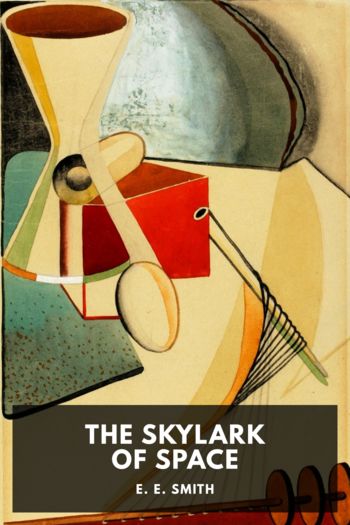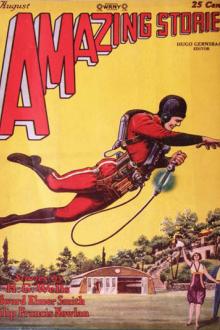The Skylark of Space, E. E. Smith [books to read in your 20s .txt] 📗

- Author: E. E. Smith
Book online «The Skylark of Space, E. E. Smith [books to read in your 20s .txt] 📗». Author E. E. Smith
Never before had Earthly eyes rested upon such scenes of splendor. Every color and gradation of their peculiar spectrum was present, in solid, liquid, and gas. The carefully-tended trees were all colors of the rainbow, as were the grasses and flowers along the walks. The fountains played streams of many and constantly-changing hues, and even the air was tinted and perfumed, swirling through metal arches in billows of ever-varying colors and scents. Colors and combinations of colors impossible to describe were upon every hand, fantastically beautiful in that peculiar, livid light. Diamonds and rubies, their colors so distorted by the green radiance as to be almost unrecognizable; emeralds glowing with an intense green impossible in earthly light, together with strange gems peculiar to this strange world, sparkled and flashed from railings, statues, and pedestals throughout the ground.
“Isn’t this gorgeous, Dick?” whispered Dorothy. “But what do I look like? I wish I had a mirror—you look simply awful. Do I look like you do?”
“Not being able to see myself, I can’t say, but I imagine you do. You look as you would under a county-fair photographer’s mercury-vapor arc lamps, only worse. The colors can’t be described. You might as well try to describe cerise to a man born blind as to try to express these colors in English, but as near as I can come to it, your eyes are a dark sort of purplish green, with the whites of your eyes and your teeth a kind of plush green. Your skin is a pale yellowish green, except for the pink of your cheeks, which is a kind of black, with orange and green mixed up in it. Your lips are black, and your hair is a funny kind of color, halfway between black and old rose, with a little green and …”
“Heavens, Dick, stop! That’s enough!” choked Dorothy. “We all look like hobgoblins. We’re even worse than the natives.”
“Sure we are. They were born here and are acclimated to it—we are strangers and aren’t. I would like to see what one of these people would look like in Washington.”
Nalboon led them into the palace proper and into a great dining hall, where a table was already prepared for the entire party. This room was splendidly decorated with jewels, its many windows being simply masses of gems. The walls were hung with a cloth resembling silk, which fell to the floor in shimmering waves of color.
Woodwork there was none. Doors, panels, tables, and chairs were cunningly wrought of various metals. Seaton and DuQuesne could recognize a few of them, but for the most part they were unknown upon the Earth; and were, like the jewels and vegetation of this strange world, of many and various peculiar colors. A closer inspection of one of the marvelous tapestries showed that it also was of metal, its threads numbering thousands to the inch. Woven of many different metals, of vivid but harmonious colors in a strange and intricate design, it seemed to writhe as its colors changed with every variation in the color of the light; which, pouring from concealed sources, was reflected by the highly-polished metal and innumerable jewels of the lofty, domed ceiling.
“Oh … isn’t this too perfectly gorgeous?” breathed Dorothy. “I’d give anything for a dress made out of that stuff, Dick. Cloth-of-gold is common by comparison!”
“Would you dare wear it, Dottie?” asked Margaret.
“Would I? I’d wear it in a minute if I could only get it. It would take Washington by storm!”
“I’ll try to get a piece of it, then,” smiled Seaton. “I’ll see about it while we are getting the copper.”
“We’d better be careful in choosing what we eat here, Seaton,” suggested DuQuesne, as the Domak himself led them to the table.
“We sure had. With a copper ocean and green teeth, I shouldn’t be surprised if copper, arsenic, and other such trifles formed a regular part of their diet.”
“The girls and I will wait for you two chemists to approve every dish before we try it, then,” said Crane.
Nalboon placed his guests, the light-skinned slaves standing at attention behind them, and numerous servants, carrying great trays, appeared. The servants were intermediate in color between the light and the dark races, with dull, unintelligent faces, but quick and deft in their movements.
The first course—a thin, light wine, served in metal goblets—was approved by the chemists, and the dinner was brought on. There were mighty joints of various kinds of meat; birds and fish, both raw and cooked in many ways; green, pink, purple, and white vegetables and fruits. The majordomo held each dish up to Seaton for inspection, the latter waving away the fish and the darkest green foods, but approving the others. Heaping plates, or rather metal trays, of food were placed before the diners, and the attendants behind their chairs handed them peculiar implements—knives with razor edges, needle-pointed stilettoes instead of forks, and wide, flexible spatulas, which evidently were to serve the purposes of both forks and spoons.
“I simply can’t eat with these things!” exclaimed Dorothy in dismay, “and I don’t like to drink soup out of a can, so there!”
“That’s where my lumberjack training comes in handy,” grinned Seaton. “With this spatula I can eat faster than I could with two forks. What do you want, girls, forks or spoons, or both?”
“Both, please.”
Seaton reached out over the table, seizing forks and spoons from the air and passing them to the others, while the natives stared in surprise. The Domak took a bowl filled with brilliant blue crystals from the majordomo, sprinkled his food liberally with the substance, and passed it to Seaton, who looked at the crystals attentively.
“Copper sulphate,” he said to Crane. “It’s a good thing they add it at the table instead of cooking with it, or we’d be out of luck.”
Waving the copper sulphate away, he again reached out, this time producing a pair of small salt- and pepper-shakers, which he passed to the Domak after he





Comments (0)